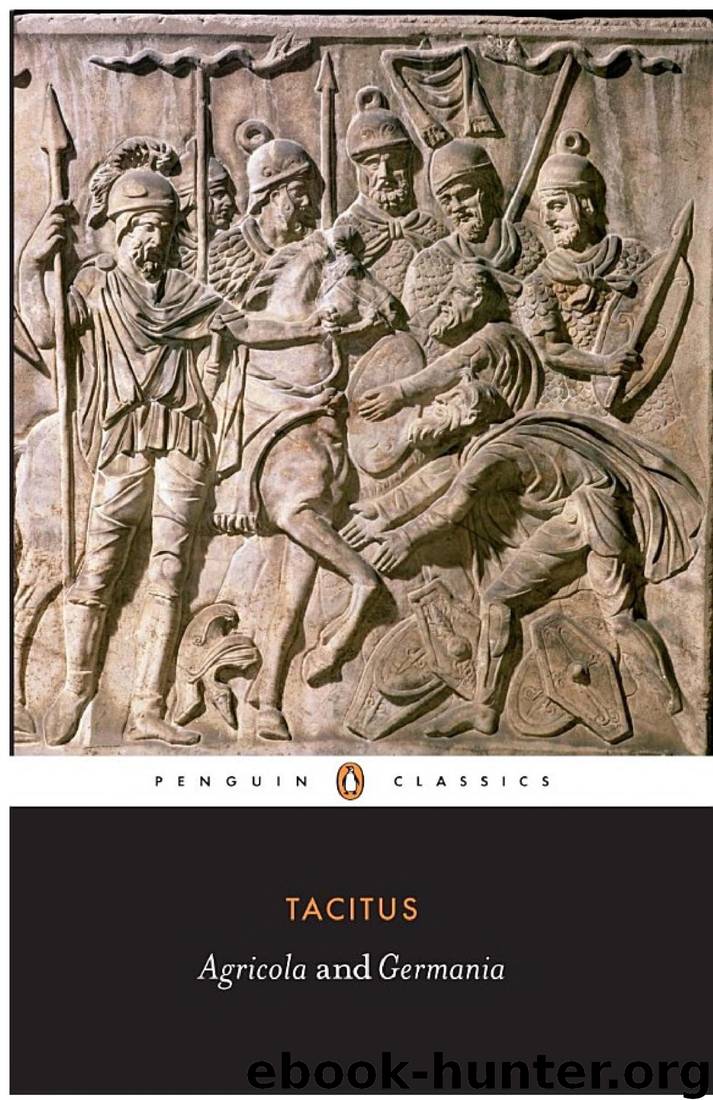Agricola and Germania by Tacitus

Author:Tacitus
Language: eng
Format: epub
Tags: History, Ancient, Rome, Europe, Great Britain, General, Biography & Autobiography, Historical, Military, Literary Collections, Ancient & Classical, Social History
Publisher: Penguin UK
Published: 2010-01-07T05:42:02+00:00
Glossary of Terms
auxiliaries Non-citizen troops, often from less developed parts of the empire, serving with the Roman army; from the reign of Augustus on they constituted a formal and permanent supplement to the citizen legions and were organized into formal units with fixed names.
centurion The chief professional officer in the Roman army, normally promoted from the ranks. There were normally six centurions in a cohort, each in command of a century of eighty men.
cognomen See ‘names’.
cohort A Roman army unit; legions were divided into ten cohorts of 480 men each. Auxiliary infantry were also organized into cohorts of 500 men, under the command of a prefect.
colony A new foundation of Roman citizens established under the authority of officials in Rome; in the imperial period, it became increasingly common for indigenous towns to be given colonial status, sometimes with the addition of settlers from Italy, so that their inhabitants acquired Roman citizenship. In the late republican and early imperial periods, colonial foundations were often used to provide settlement for veterans.
commonwealth See ‘Republic’.
consul The chief executive official in the Roman republican constitution; traditionally, two consuls were elected each year, so that the annual consulships could be used for dating purposes: ‘in the consulship of so-and-so and so-and-so’. This practice continued in the imperial period, although the position of consul became largely honorary; it also became customary for the initial consuls of the year to resign before the end of their terms in favour of replacements (known as ‘suffect consuls’). Men who had held the consulship were known as consulars; major provincial governorships were normally held by men of consular rank.
divus A Latin word meaning ‘god’, an alternative to the more common word deus; in the imperial period, it was used almost exclusively as a title for emperors who were officially deified after their deaths.
equestrian The equestrian order was the second tier of the Roman elite, ranking just below the senatorial order; men of equestrian rank had to possess property worth at least 400,000 sesterces. In the early imperial period equestrians began to fill an increasing number of administrative positions and military commands.
freedman In Roman tradition, a slave who had been freed by his owner became that person’s freedman (or woman); freedmen were free Roman citizens, but had certain obligations to their former owners and often continued to work for them in some capacity.
legate A representative of a Roman official who exercised command under that official’s authority. In the early empire, legates of praetorian rank often served as commanders of legions and as governors of lesser provinces under the direct authority of the emperor; more important provinces, such as Britannia, were governed by legates of consular rank.
legion Latin legio, the largest division of the Roman army. Only Roman citizens could serve in a legion; non-citizens served in the auxiliaries. By the late Republic, a legion nominally consisted of ten cohorts, each containing six centuries of eighty men, for a total strength of 4,800; the first cohort, however, seems normally to have been larger than the others.
Download
This site does not store any files on its server. We only index and link to content provided by other sites. Please contact the content providers to delete copyright contents if any and email us, we'll remove relevant links or contents immediately.
| France | Germany |
| Great Britain | Greece |
| Italy | Rome |
| Russia | Spain & Portugal |
Fanny Burney by Claire Harman(25789)
Empire of the Sikhs by Patwant Singh(22176)
Out of India by Michael Foss(16313)
Leonardo da Vinci by Walter Isaacson(11912)
Small Great Things by Jodi Picoult(6102)
The Six Wives Of Henry VIII (WOMEN IN HISTORY) by Fraser Antonia(4797)
The Wind in My Hair by Masih Alinejad(4427)
The Lonely City by Olivia Laing(4122)
The Crown by Robert Lacey(4111)
A Higher Loyalty: Truth, Lies, and Leadership by James Comey(4038)
The Iron Duke by The Iron Duke(3642)
Millionaire: The Philanderer, Gambler, and Duelist Who Invented Modern Finance by Janet Gleeson(3574)
Sticky Fingers by Joe Hagan(3456)
Alive: The Story of the Andes Survivors by Piers Paul Read(3317)
Papillon (English) by Henri Charrière(3275)
Joan of Arc by Mary Gordon(3262)
Stalin by Stephen Kotkin(3089)
Aleister Crowley: The Biography by Tobias Churton(3024)
Ants Among Elephants by Sujatha Gidla(2927)
